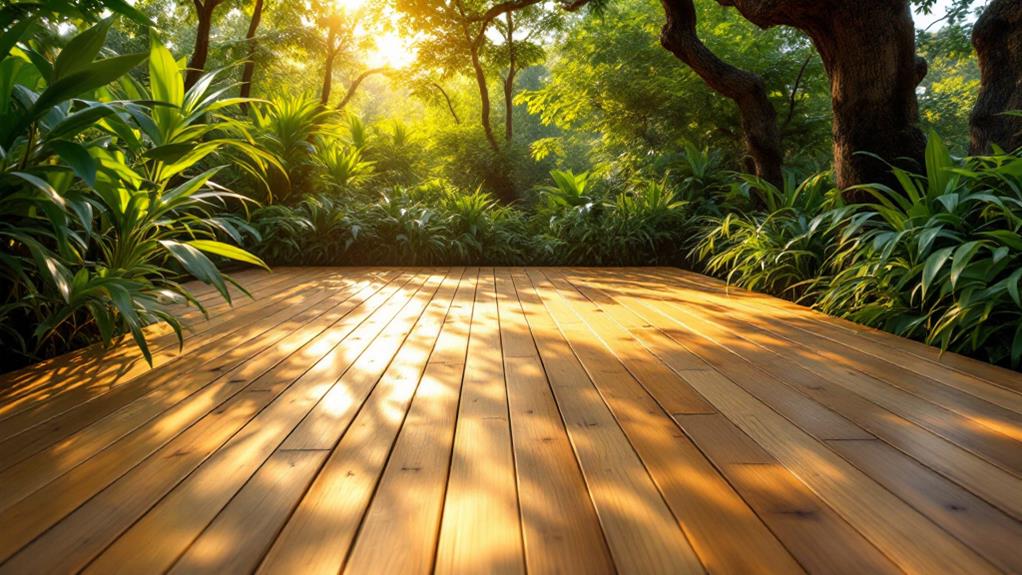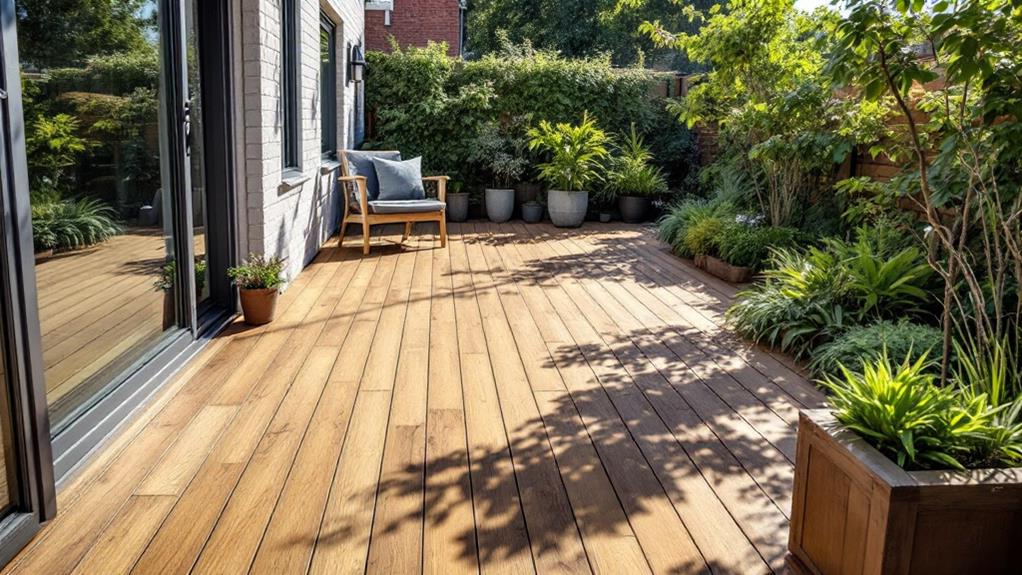
Eco-Friendly Decking Options: Sustainable Materials for Your Patio
Eco-friendly decking options like composite, bamboo, and responsibly sourced hardwoods offer sustainable, durable solutions for patios. Composite decking, incorporating over 95% recycled content, reduces deforestation and promises lifespan enhancements up to 30 years with minimal maintenance. Bamboo's rapid growth and carbon-absorbing properties make it another excellent choice, while responsibly sourced hardwoods maintain ecological balance. Recycled materials in decking reduce landfill impact, with brands like Trex leading in recycled content usage. These materials not only retain aesthetic appeal across diverse styles but also adhere to ethical production practices, contributing to sustainability. Discover how these options can transform your patio environment.
Key Takeaways
- Composite decking uses over 95% recycled content, minimizing deforestation and offering a lifespan of 25-30 years with minimal maintenance.
- Bamboo decking grows rapidly, absorbs CO2, and provides exceptional strength, reducing environmental impact and maintenance needs.
- Responsibly-sourced hardwood from managed forests ensures durability and ecological balance, with options like water-reclaimed Ipe wood.
- Recycled materials, like those used by Trex, divert waste from landfills and reduce the demand for virgin timber.
- Aluminum and porcelain decking are weather resistant, lightweight, and durable, with reduced maintenance requirements.
Understanding Sustainable Decking
Sustainable decking is a crucial component in eco-friendly construction, emphasizing the use of materials that are responsibly sourced and manufactured with minimal environmental impact. The focus on sustainable sourcing guarantees that the extraction and production processes adhere to eco-conscious design principles.
Certifications such as FSC and PEFC play an essential role in verifying that wood products originate from forests managed with stringent environmental and social standards. These certifications are integral to minimizing the ecological footprint of decking materials and promoting sustainable forestry practices.
In addition to traditional wood, composite decking presents a compelling case for sustainability enthusiasts. Made from recycled wood fibers and plastics, composite options such as those offered by Trex contain over 95% recycled content, markedly reducing the demand for virgin materials.
This innovation in material use not only extends the life cycle of decking products but also curtails the overall carbon footprint associated with their production and disposal.
Bamboo emerges as another sustainable choice, lauded for its rapid growth and CO2 absorption capabilities. When harvested responsibly, bamboo offers a minimal environmental impact, making it an ideal candidate for eco-conscious design.
Together, these sustainable materials enhance the ecological integrity of modern decking solutions.
Responsibly-Sourced Hardwood
In today's environmentally conscious construction landscape, the value of responsibly-sourced hardwood is increasingly recognized for its dual role in promoting ecological balance and offering durable, aesthetic decking solutions.
Sourced from managed forests, options like Real Cedar and Redwood exemplify sustainable sourcing, ensuring forestry practices that bolster biodiversity and ecosystem health. These woods are not only visually appealing but also contribute to carbon sequestration, thereby playing a pivotal role in climate mitigation by absorbing CO2 during their growth.
However, not all hardwoods are created equal in sustainability. Ipe wood, known for its exceptional durability lasting up to 60 years, presents sustainability challenges due to traditional sourcing practices.
Opting for water-reclaimed Ipe can mitigate these concerns, aligning it more closely with sustainable forestry principles. Certifications from the Forest Stewardship Council (FSC) and the Programme for the Endorsement of Forest Certification (PEFC) provide assurance of responsible sourcing, guiding consumers toward environmentally-friendly choices.
Benefits of Bamboo Decking

Bamboo decking presents a remarkable eco-friendly alternative in the domain of sustainable construction materials, thanks to its rapid renewability and superior strength. With growth rates reaching up to 3 feet per day, bamboo is harvested sustainably without contributing to deforestation, showcasing its bamboo versatility. This rapid growth cycle guarantees a constant supply, making bamboo a highly renewable resource.
Furthermore, bamboo's exceptional strength surpasses that of many traditional hardwoods, offering impressive durability and resilience against wear, pests, and moisture—qualities essential for outdoor applications.
The environmental benefits of bamboo extend beyond sustainable harvesting. During its growth, bamboo absorbs substantial amounts of CO2, playing a significant role in climate mitigation by reducing greenhouse gases. This aligns with the growing demand for materials that offer not only practical benefits but also sustainable aesthetics.
Heat-treated bamboo products, such as Thermo-Density by MOSO, further enhance durability while upholding eco-friendly production practices. Additionally, bamboo decking is lightweight, guaranteeing ease of installation, and is biodegradable, allowing for recycling at the end of its lifecycle.
These characteristics make bamboo a compelling choice for eco-conscious homeowners seeking a sustainable, aesthetically pleasing, and high-performance decking solution.
Advantages of Composite Decking
Composite decking emerges as a superior choice in eco-friendly construction due to its durability and sustainable material composition.
Made from recycled wood fibers and plastic, it not only minimizes deforestation but also promotes a circular economy by utilizing waste materials.
Its impressive lifespan of 25-30 years, coupled with resistance to moisture and insects, guarantees minimal maintenance and reduces the environmental impact associated with frequent replacements.
Durability and Longevity
A hallmark of composite decking's appeal lies in its remarkable durability and longevity, setting it apart from traditional wood alternatives. Among the composite advantages is its impressive lifespan, typically ranging from 25 to 30 years, which notably outlasts that of conventional wood decking. This longevity is due to the sustainable alternatives used in its construction, such as recycled wood fibers and plastics, which confer innate resistance to rotting, splitting, and insect damage.
Consequently, composite decking not only stands the test of time but also reduces the frequency of replacement, making it a cost-effective choice in the long run.
Many leading brands, like TimberTech, are committed to quality, offering products that maintain their color and structural integrity over the years. This reduces the need for ongoing maintenance, such as staining or sealing, which not only saves time and effort but also minimizes the environmental impact associated with chemical treatments.
The high density of composite materials guarantees excellent weather resistance, making them suitable for diverse climates. This robust resistance to environmental wear and tear underscores the long-term durability and reliability of composite decking, reinforcing its position as a preferred choice for eco-conscious homeowners.
Eco-Friendly Material Composition
In the domain of sustainable building materials, composite decking emerges as a compelling choice due to its eco-friendly composition. This innovative material is crafted primarily from recycled content, incorporating up to 60% wood flour and 35% recycled high-density polyethylene (HDPE). By utilizing these recycled components, composite decking considerably reduces the need for virgin resources, making it a responsible choice for eco-conscious consumers.
The environmental benefits of composite decking extend beyond its composition. With a lifespan of 25-30 years, it offers remarkable durability while minimizing maintenance, unlike traditional wood, which demands regular staining and sealing. Additionally, composite materials are resistant to rot, splintering, and insect damage, providing a long-lasting alternative that curtails deforestation by repurposing waste materials.
The manufacturing process of composite decking is also significant for its reduced greenhouse gas emissions compared to traditional wood. This feature enhances its overall sustainability profile, aligning with eco certifications that prioritize reduced environmental impact.
Brands such as TimberTech emphasize high percentages of recycled content, underscoring their commitment to environmental responsibility and landfill waste reduction. Therefore, composite decking stands as an example of sustainable innovation in patio construction.
Exploring Recycled Materials

Frequently hailed as a sustainable solution, recycled decking materials offer an environmentally responsible alternative to traditional timber. By integrating recycled plastics and sustainable composites, these materials considerably reduce the demand for virgin timber and help minimize waste. Remarkably, brands such as Trex have pioneered the use of recycled content, constructing their composite decks with over 95% recycled materials, including reclaimed sawdust and polyethylene film. This approach effectively diverts millions of pounds of plastic waste from landfills annually.
The incorporation of post-consumer plastics into decking materials serves as a robust deterrent against moisture and insect damage, extending the lifespan of outdoor installations. Additionally, recycled materials contribute to the prevention of deforestation and significantly decrease the carbon footprint associated with sourcing and producing new materials.
| Brand | Recycled Content (%) |
|---|---|
| Trex | Over 95% |
| TimberTech | High percentage |
| Ecodek | High percentage |
Brands like TimberTech and Ecodek are committed to utilizing high percentages of recycled materials, reinforcing their dedication to sustainability. In choosing recycled decking options, consumers can enjoy the dual benefits of enhanced durability and reduced environmental impact, making these materials an ideal choice for eco-conscious outdoor living spaces.
Durability of Eco-Friendly Decking
Eco-friendly decking options offer impressive durability and sustainability, with materials like composite decking lasting up to 30 years while incorporating recycled resources.
Long-lasting choices such as Ipe wood and recycled plastic lumber provide resistance to environmental factors like pests and moisture, minimizing maintenance needs.
Additionally, thermally modified wood and bamboo decking enhance durability with natural resistance to decay and a reduced environmental impact, making them ideal choices for sustainable construction.
Long-Lasting Material Choices
When selecting materials for eco-friendly decking, prioritizing durability is essential for both environmental sustainability and long-term cost-effectiveness.
A thorough decking lifespan and material comparison reveals several promising options. Composite decking, with a lifespan of 25-30 years, is derived from recycled materials, offering resilience while minimizing maintenance needs compared to traditional wood.
Ipe wood stands out for its remarkable longevity, potentially lasting up to 60 years due to its innate resistance to pests and decay, provided it is sourced sustainably.
For those seeking rapid renewability and strength, bamboo decking is an excellent choice. It matures swiftly and surpasses many hardwoods in durability, ensuring a minimal environmental footprint.
Reclaimed wood presents an ideal sustainable alternative by repurposing materials from old structures, capable of enduring for decades with proper upkeep.
Aluminum decking offers a unique blend of benefits, being lightweight, rust-resistant, and able to withstand harsh weather, consequently ensuring extended longevity.
- Composite Decking: Made from recycled materials, lasts 25-30 years.
- Ipe Wood: Naturally resistant, can last up to 60 years.
- Bamboo Decking: Rapidly renewable and strong, outlasts many hardwoods.
- Aluminum Decking: Lightweight, corrosion-resistant, withstands extreme conditions.
Minimal Maintenance Requirements
In the domain of eco-friendly decking, minimal maintenance requirements stand as an essential factor for sustainability and user convenience. Composite decking, crafted from recycled wood fibers and plastic, exemplifies this with a lifespan of 25-30 years and requires no staining or sealing, contrasting sharply with traditional wood decking that demands regular upkeep. This sustainable upkeep not only conserves resources but markedly reduces maintenance efforts.
Ipe wood, renowned for its durability, extends this notion further. Naturally resistant to pests and decay, it offers a lifespan of up to 60 years with little maintenance, presenting an ideal choice for those seeking long-term solutions with minimal intervention.
Similarly, bamboo decking, a rapidly renewable resource, demands reduced decking maintenance due to its inherent resistance to moisture and pests.
Recycled plastic lumber is another compelling option, impervious to moisture and insects, ensuring durability and eliminating the need for chemical treatments. Its minimal upkeep requirements make it an attractive option for eco-conscious consumers.
Meanwhile, porcelain decking, known for its non-porous surface, excels in sustainable upkeep with a lifespan often exceeding 50 years, effectively reducing mold and mildew growth.
These eco-friendly alternatives offer practical, low-maintenance solutions conducive to sustainable living.
Resistance to Environmental Factors
Sustainability in deck construction is greatly enhanced by the durability of materials that can withstand environmental challenges. Eco-friendly decking options are designed to offer superior weather resistance and pest resistance, guaranteeing longevity with minimal environmental impact.
Composite decking, for example, combines recycled wood fibers and plastics, offering a lifespan of 25-30 years while resisting rotting, splitting, and insect damage. This makes it an excellent choice for areas exposed to harsh weather conditions.
Ipe wood, renowned for its remarkable hardness, boasts a lifespan of up to 60 years. Its natural pest resistance and decay resistance mean it requires minimal maintenance, making it ideal for sustainable decks.
Similarly, bamboo decking offers robustness surpassing many hardwoods, with strong resistance to moisture and pests, all while maintaining a low carbon footprint thanks to its rapid growth and CO2 absorption.
Recycled plastic lumber, impervious to moisture and insects, guarantees a prolonged lifespan without the need for frequent upkeep. Porcelain decking, made from recycled materials, is non-porous and resistant to mold, mildew, and weather fluctuations, often exceeding a 50-year lifespan. These characteristics make it a durable, eco-friendly decking option.
- Composite decking: Lifespan of 25-30 years, resistant to rot and insects
- Ipe wood: Lasts up to 60 years, naturally pest-resistant
- Bamboo decking: Strong, moisture and pest-resistant
- Recycled plastic lumber: Moisture and insect-proof, minimal maintenance
Aesthetic Appeal in Design

How do eco-friendly decking materials enhance the aesthetic appeal of outdoor spaces? The versatility of eco-friendly decking materials allows homeowners to explore diverse color palettes and texture combinations, elevating the visual allure of patios. Porcelain tile decking, notable for its designs mimicking natural materials, offers an aesthetic that harmonizes with various architectural styles while boasting a lifespan exceeding 50 years. Its low energy production cost further underscores the sustainable advantage.
Composite decking provides a plethora of colors and styles, merging aesthetics with durability. It enables homeowners to customize their outdoor spaces without compromising on maintenance ease. Bamboo decking, with its natural grain, offers a unique aesthetic that can be accentuated through various stain colors, adding depth and richness to patios.
| Material Type | Aesthetic Features | Sustainability Benefits |
|---|---|---|
| Porcelain Tile | Mimics natural materials | Long lifespan, low energy production |
| Composite Decking | Numerous colors and styles | Durable, low maintenance |
| Bamboo Decking | Natural grain, stain options | Renewable resource |
Reclaimed wood decking's rustic charm, with its inherent character, not only beautifies outdoor spaces but also echoes environmental consciousness by repurposing existing materials. Meanwhile, plastic lumber decking's wide array of colors and designs offers a modern aesthetic, perfectly complementing contemporary outdoor environments.
Environmental Impact Considerations
While the aesthetic appeal of eco-friendly decking materials is undeniable, their environmental impact plays an equally significant role in decision-making for environmentally conscious consumers.
The carbon footprint of decking materials is largely influenced by their sourcing, with certifications such as FSC and PEFC guaranteeing sustainable forestry practices. These certifications assure responsibly harvested wood, minimizing deforestation and preserving biodiversity.
Additionally, the manufacturing processes of composite and plastic decking can contribute to greenhouse gas emissions, making the location and methods of production pivotal in evaluating sustainability.
Transportation distance also affects the carbon footprint, with local sourcing substantially reducing environmental impact.
Utilizing recycled materials, such as Trex's commitment to 95% recycled plastic and reclaimed sawdust, diverts waste from landfills and lessens reliance on virgin resources.
Moreover, traditional wood decking often requires treatments that release harmful chemicals and VOCs, underscoring the need for low-impact or non-toxic alternatives.
To summarize the environmental considerations:
- Sustainable sourcing: Certifications guarantee responsible forestry practices.
- Manufacturing emissions: Production methods can affect sustainability.
- Transportation impact: Local sourcing reduces the carbon footprint.
- Recycled materials: Divert waste and reduce the need for new resources.
Ethical Production Practices

Ethical production practices are essential to the sustainable decking industry, guaranteeing that environmental integrity is maintained throughout the supply chain. By prioritizing sustainable forestry and responsible sourcing, decking manufacturers support ecosystem services and protect biodiversity, minimizing environmental impact.
Key to these efforts are ethical certifications, such as those from the Forest Stewardship Council (FSC) and the Programme for the Endorsement of Forest Certification (PEFC), which verify that wood products originate from responsibly managed forests.
Supply chain transparency is a cornerstone of ethical production. Many sustainable decking brands actively conduct vendor assessments and facility tours to verify compliance with ethical standards, fostering accountability throughout their operations.
This commitment extends to the use of recycled materials, exemplified by brands like Trex, which incorporate recycled plastics and timber, reducing landfill waste and reinforcing their ethical production stance.
Furthermore, companies dedicated to ethical production focus on minimizing harmful emissions during manufacturing processes, contributing considerably to environmental sustainability.
Choosing Eco-Friendly Stains
Selecting eco-friendly stains is pivotal for maintaining both a sustainable outdoor environment and the longevity of your decking materials. Conventional deck stains often contain harmful chemicals and high volatile organic compounds (VOCs), which not only pose health risks but also contribute to environmental degradation.
Shifting to eco-friendly options can mitigate these effects, offering a spectrum of benefits. Plant-based stains, derived from natural oils, waxes, or water-based acrylics, stand out as safer alternatives. These natural finishes reduce chemical runoff and toxicity, fostering a healthier outdoor space.
Brands such as DEFY Extreme, Messmers UV Plus, and BioAdvanced are recommended for their commitment to environmentally responsible products. Remarkably, these brands focus on enhancing color retention while safeguarding your deck.
Choosing eco-friendly stains supports sustainable practices and extends the life of your deck. By reducing pollution, these solutions align with the broader goals of environmental preservation.
For those seeking to minimize maintenance and chemical use entirely, opting for unfinished decking materials like plastic lumber is a viable option.
Consider the following when selecting eco-friendly stains:
- Reduced VOCs for healthier air quality
- Natural finishes that are safer for the environment
- Enhanced color retention for longevity
- Commitment to sustainable practices through eco-conscious brands
Frequently Asked Questions
What Is the Most Environmentally Friendly Decking?
The most environmentally friendly decking options are those utilizing recycled plastics and composite materials. These solutions minimize landfill waste and resource consumption while offering durability and low maintenance, making them superior choices for sustainable outdoor construction.
What Is the Best Natural Material for a Deck?
For ideal deck maintenance and natural aesthetics, bamboo emerges as the best natural decking material. Its rapid growth, strength, and sustainability surpass traditional hardwoods, offering a durable solution that aligns with environmental standards and aesthetic preferences.
What Is the Most Sustainable Wood for a Deck?
The most sustainable wood for a deck often involves certified timber or recycled wood. Certified timber, particularly from FSC or PEFC sources, guarantees responsible forestry practices, while recycled wood minimizes environmental impact by repurposing existing materials.
What Is the Most Economical Deck Material?
Composite decking stands out as a cost-effective alternative due to its low maintenance and longevity, making it a budget-friendly choice. Despite higher initial costs, its durability and minimal upkeep offer significant savings compared to traditional wood options.
Conclusion
To sum up, selecting eco-friendly decking options greatly contributes to environmental sustainability by utilizing responsibly-sourced hardwood, bamboo, and composite materials. These sustainable alternatives offer durability and aesthetic appeal while minimizing ecological footprints. The incorporation of recycled materials further enhances environmental benefits. Ethical production practices and the use of eco-friendly stains are crucial in ensuring thorough sustainability. As a result, prioritizing sustainable decking materials not only supports environmental conservation but also promotes responsible consumer behavior in the construction and design sectors.



Leave a Reply